Welcome to Monday.
Here are the most notable stories BikePortland editors and readers came across in the past seven days.
Fitting for America’s paper of record: The New York Times is very concerned about the “anarchy” in the streets of Paris as that city goes bonkers for bicyclings and shows some very unsurprising growing pains on its way to becoming a low-car cycling mecca.
20 is too much: The whole of central London will be a 15 mph zone by next year, as the city gets serious about its goal to eliminate deaths and serious injuries by 2040.
Bookmark it: A must-read article on induced demand from Bloomberg City Lab will give you all the background ammunition you need in the freeway fight.
Policing traffic: The Freakonomics podcast got into how car culture has contributed to over-policing of people of color in America.
Anti clean energy: The powers-that-be who control The Oregonian don’t like Portland’s new Clean Energy Fund program. How can I tell? Look at the language they use to frame it: “spending spree”, “dole out”, “massive cash infusion”, “few strings attached”. And no, that’s not an op-ed.
Advertisement
Epic Paris Roubaix: One of cycling’s most storied races returned after a Covid absence and fans were treated to a stunningly hellish and exciting race by the men and a heroic and historic effort by the women.
Watch car supremacy work: Witnesses believe a teenager driving a massive lifted truck in Texas purposely ran a group of bicycle riders over, but since he’s just an innocent kid with college aspirations, he’s already been released and his lawyer thinks we should go easy on him.
Free the bus: We spend so much time debating the need for billions of dollars in government subsidies for freeway expansions, yet we still treat buses like a retail product. Here’s a good case for why buses should be free.
About those trees: Feeling a bit better about your new car purchase because the dealership plants trees for every new car sold? You might want to read this.
PPB cracks down: Portland Police Bureau used a new city ordinance to ticket, tow cars and arrest people who showed up to a street racing and sliding gathering in north Portland.
Thanks to everyone who sent us links this week!
— Jonathan Maus: (503) 706-8804, @jonathan_maus on Twitter and jonathan@bikeportland.org
— Get our headlines delivered to your inbox.
— Support this independent community media outlet with a one-time contribution or monthly subscription.



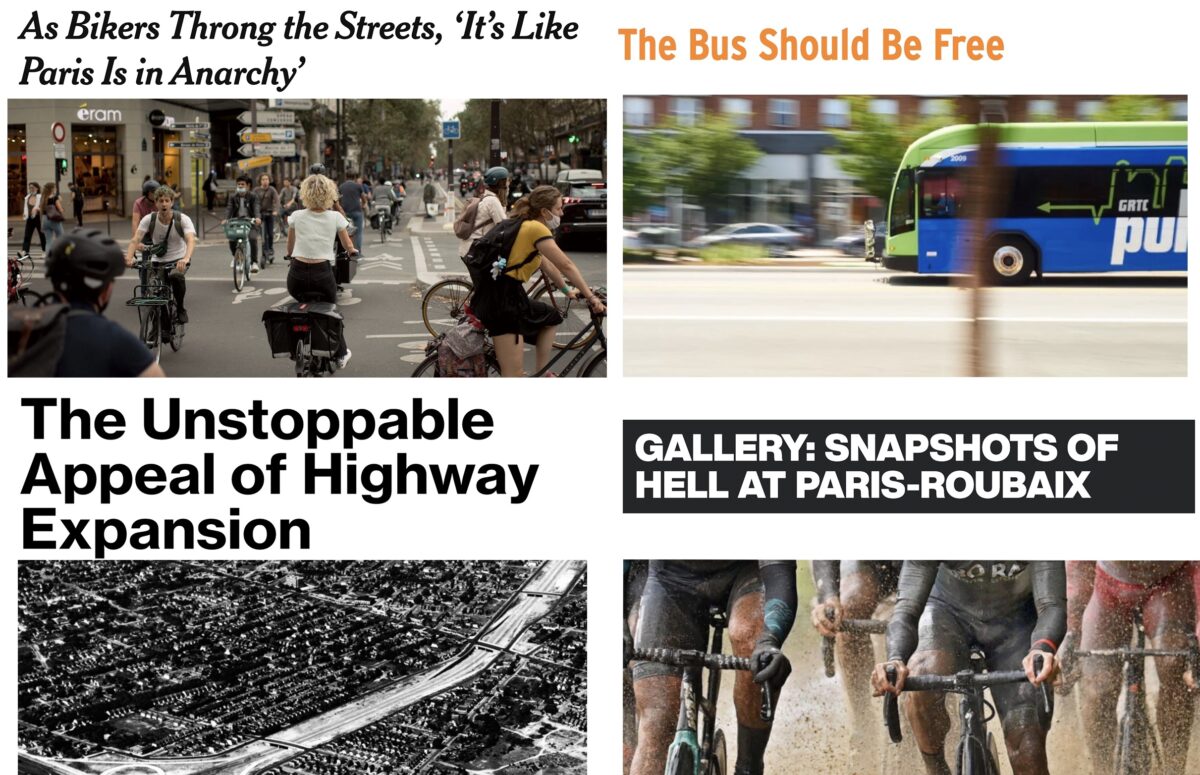
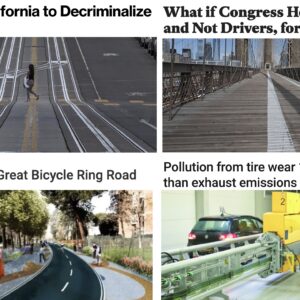
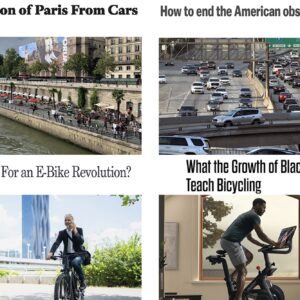
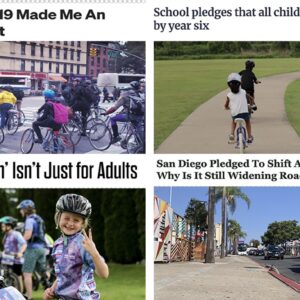
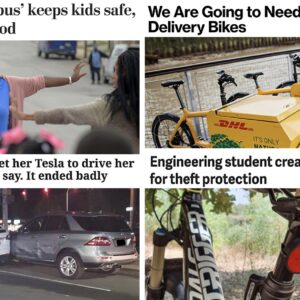
Thanks for reading.
BikePortland has served this community with independent community journalism since 2005. We rely on subscriptions from readers like you to survive. Your financial support is vital in keeping this valuable resource alive and well.
Please subscribe today to strengthen and expand our work.
I watched the Paris-Roubaix highlights – absolutely bonkers.
Glad to see Cobrelli with a Monument win!
That NY Times article made me laugh when I saw it this weekend. No data, just randoms complaining. High quality journalism right there.
The rich n’ woke will throw bicycles under the bus every single time, which is why I’ve never understood the fawning attempts to make common cause with them.
They’ll throw the bus under the bus, too…
Poor New York Times clutching their pearls and lamenting that cyclist are getting their share of the streets. As usual for “The Mouthpiece of the Comfortable Class ” they frame all activities that conflict with their mission of furthering the status quo as chaos or anarchy.
The entire point of the NYT piece was about aggressive behavior of people cycling towards pedestrians which is a common problem in cities with higher bike mode share. Characterizing the rude behavior of people cycling towards people walking and towards more cautious cyclists as “furthering the status quo” is a really bad take.
That is what the piece is about. But I’d say it’s at best a ginned up issue that mischaracterizes the threats road users actually face. Many, many more pedestrians die from car and truck violence than bike or scooters. I mean, with all the increased cycling in Paris this past year, we’re looking at one or two cases vs more than a dozen killed by cars and trucks. This piece is basically just about bad vibes people feel towards cyclists than real, quantifiable danger. If it seriously dealt with risks posed to pedestrians then it would be all about how cars consistently maim and kill people.
Are conflicts between bikes and peds increasing? Yes, because mode share is going up so dramatically, as it should if we are going to decarbonize our transportation system. It’s something that everyone is going to have to get used to. And something engineers and planners should be cognizant of when force mixing between cyclists and peds vs taking back road space from cars. But the overall thrust of this piece is, “cyclists, assholes! am I right?” When in fact people are assholes and an asshole in a car is 1000% more dangerous than one on a bike. It’s just a new and novel annoyance vs the deadly devil we know.
The piece was about the tension and stress that pedestrians and cautious cyclists feel, not about carnage.
It’s not as simple as mode share going up. Cultural attitudes also play a role. For example, CPH and AMS both have very high cycling mode share but CPH is a great place to walk while AMS is notorious for rude behavior towards peds by people on bikes.
And this has also been a long-term problem in Portland even with its minuscule cycling mode share. For example, in areas with higher cycling levels (e.g. Williams, West side of Tilikum bridge, Moody) it is common for people biking to not cede right of way to peds at marked or unmarked crosswalks.
The feeling it addresses are regarding the perception of risk. “It’s becoming risky just to cross the street!” I got news for her about that. It’s always been dangerous to cross the street, and it has so much more to do with cars than bikes. Internalized car-centric culture is causing a misperception of the true violence all around us.
In very real terms the article is going to be used/shared/cited to diminish and disparage the very real and necessary good that Paris has done to try to reduce the number of cars on the road. We need to be doing this all over the world, like 10 years ago. But it’s articles like these try to concern troll away momentum towards a car free future.
The one thing I hear that rings true in this article is frankly unnecessary conflicts between cyclists and pedestrians where engineers have half-assedly resorted to multi use paths for commuters or stolen sidewalk space from pedestrians to accommodate a bike lane vs just taking a full lane away from cars. If you look at video of Rue de Revoli or Boulevard de Sébastopol during rush hour, the two way cycle tracks are packed. I’d say expand to full width 8ft+ bike lanes each way and we would see less conflict.
Very relevant article on crossing bike lanes in the Netherlands: https://bicycledutch.wordpress.com/2019/06/12/how-hard-is-it-to-cross-the-cycle-path/
Define ‘problem’ I guess. I consider pedestrians being pancaked by speeding motorists to be a problem. I consider gun violence a problem. I consider homelessness a problem. What do those all have in common? Statistics to show the that problem is both severe and widespread.
95% of road users in Portland don’t yield to pedestrians at marked or unmarked crosswalks. That needs to change but I’m just not hearing very much about pedestrians being killed or even hit because a cyclist failed to yield ROW.
The point of the article was to raise NIMBY baseless concerns about a city that is making a great effort to move away from SOV transportation. If you are going to call something ‘anarchy in the streets’, you better have some solid evidence that a real problem even exists. Not just interviews with random people on the street whining.
Are more people being hospitalized because they were hit by a cyclist? Are there more reports to the police about being hit by a cyclist? Literally any evidence whatsoever that this “problem” actually exists?
As long as you have humans involved, you will have jerks who don’t yield to pedestrians. I’m much much much much more concerned about the motorist who commonly fail to yield ROW to pedestrians on N Williams than I am the cyclists.
My comment (and the NYTs pieced) focused on conflict between people biking and walking and not on cages or their violent and homicidal drivers. Your response is a strawman.
It’s really not. I encourage you to take another pass at what I wrote. A journalist walking around and talking about to randoms and then calling it ‘anarchy on the streets’ is garbage.
If the problem really exists in any meaningful way, the journalist should do research and find at least something hard that substantiates it. The piece as written is about the level that I’d expect from day time local news.
You can find people who support any narrative if you really want to. I’d love to get paid to go to Paris and find a couple random people to get quotes from about how great all the bike infrastructure is. They are out there.
Apparently, Cmh89 is arguing that Mayor Hidalgo’s Deputy for Transportation, David Belliard (a noted ecologist, French Gr*en Party leader, and the architect of the massive expansion in cycling infra in Paris) is some random person not worthy of being interviewed.
Cmh89 also implictly described Mikael Colville-Andersen as some random no one with no expertise (Note: I am not a fan due to his previous misogynistic blog but he is most definitely an influential expert whose comments in this piece I agree with.)
And finally I want to note that Cmh89 also implicitly suggested that the multiple interested but concerned cyclists who were interviewed are also “randoms” who should be ignored.
This has absolutely nothing to do with any of my comments so this is once again a strawman.
The ridiculous title came from a single quote in the piece and does not reflect the content of the piece well (I suspect that this was an “editorial” decision and not the author’s choice). At one point this type of clickbait title would not have been allowed at the NYTs, but like Rupert Murdoch’s rags, the hundred m*llionaire-owned NYT has become a t*bloid, ATMO.
Wow! Speaking of strawmen, you are sure are good at making things up!
Anecdotal “person-on-the-street” interviews are generally worthless. They are easy and you get good quotes you can select through to support your narrative. That’s why local news uses them.
This garbage piece is full of colorful language to make the reader feel that a dangerous situation but the author can’t point to anything substantive to support the idea that there is “anarchy” on the streets of Paris. In fact, the only two ‘experts’ in the article don’t seem to support the idea that Paris’s streets are in a state of anarchy at all.
I’m not sure the Deputy of Transportation wanting to improve the transportation network, and a consultant for bike infrastructure saying the system should be improved are indicative of chaos and anarchy.
On the contrary, the garbage title reflects the garbage contents quite well. The article has no substance at all.
I’m not saying there isn’t a problem, I’m saying that this article uses anecdotes and emotion to try and convince the reader exists because they don’t have any facts to back up the conclusion they want their reader to take away.
If the journalist wanted to write this story, they could have had their human-interest interviews accentuated with data that supports the idea that the problem exists. Is bike mod share declining? Are we seeing more injuries? Are less people walking?
But they didn’t, because this is a generic NIMBY anti-bike hit piece and nothing more.
Guilty. I find when I ride these areas (moreso Williams, less so Moody) I am so focused on co-existing with the cars next to me that I don’t have yielding to peds at the front of my mind (I should, I know). Then I don’t have enough time to stop without doing so dangerously. I think if the cars next to me were better about yielding, I would be too. As it is, I’m often too focused on self-preservation.
Also guilty.
And that was one of the points of the NYT piece…that stress was a cause of some of that bad behavior with the perennial call for infrastructure improvements (by Colville-Andersen and Deputy Mayor Belliard). I have mixed feelings about Belliard’s call for more enforcement. This might work in Paris where a social*st/c*mmunist/g*een coalition runs the government but in PDX having Traffic Officer Balzer hand out tickets would likely be a nightmare.
This is how 8 feel when I hear Portland cyclists talk about “paint isn’t protection” and “8 to 80”.
If feeling safe on the streets is important for cyclists, then it is important for others as well.
IMO, the reason this concept is so controversial among some cycling enthusiasts is that many still have a “vehicular cycling” bias. (Car head but on two wheels.)
I think exactly the opposite. Someone who sees bikes as vehicles would understand they don’t belong in pedestrian spaces and have an obligation to yield.
Someone who views bikes as just like pedestrians, but maybe more so, is more likely to think they can ride as they want through a throng of people shouting “HOT PIZZA”* causing only anecdotal harm.
*https://www.spokesman.com/stories/2017/oct/18/woman-sues-hot-pizza-bicyclist-who-crashed-into-he/
Stop linking to the NYT. Can’t believe anyway has bothered to take them seriously since the whole Iraq WMD thing. Never mind the 2000 other examples of their hot garbage
Lets not be censoring things. BP should be allowed to link to the NYT as well as Mad Magazine, Cracked, and The Onion as they see fit.
NYT: “Ronin’s Paris is canon and must be preserved” https://www.youtube.com/watch?v=MxxH0lZSYgU
Re: 20 is too much: “The whole of central London will be a 15 mph zone by next year, as the city gets” – The article says that the change only applies to the historic center, known was the City of London neighborhood, which is about 1 square mile.
15 mph? Speed demons! Downtown Portland is only 12 mph.
With 8,000 actual residents, the area within the old long-gone city walls.
Criticisms of the Clean Energy Fund are well-founded. It really is a giant slush fund with limited oversight, no real way to measure success or impact, and some wacky acceptance criteria. From Angus Duncan and Steve Novick’s August piece in the Oregonian:
‘Applicants for large-scale grants of up to $10 million can earn no more than 8 points out of 100 for reducing greenhouse gas emissions. Think about that: “Clean Energy Fund” applicants could, apparently, get 92 points out of 100 without reducing greenhouse gas emissions at all. Meanwhile, applicants can only lose 5 points if their proposal will not “realistically result in intended outcomes.” So, you could get 95 out of 100 points even if your project has no realistic chance of succeeding.’
https://www.oregonlive.com/opinion/2021/08/opinion-portland-clean-energy-fund-needs-better-criteria-for-choosing-climate-projects.html
I voted against the measure, since this result was fairly obvious to me. I don’t have any beef with the concept, however. And now that it’s passed, I hope we can improve it and make it work. Hopefully the bad press will lead to meaningful change.
Well stated. I voted for the measure but now regret doing so. The language used by the O is justified. If there aren’t changes such as suggested by Steve and Angus (hardly right wingers!) This thing will become a massive fiasco worthy of the ridicule to come.
Bit of a blind spot for JM to snark past what is a deeply flawed program.
Not a blind spot VS but I see why you would think that. My beef is more about media criticism. The O pulls this type of thing all the time with stuff they don’t like. They made a big hullabaloo about how expensive the 2030 Bike Plan was, despite the fact that the plan dedicated ZERO dollars to anything. A reporter from The O also published a very opinionated and inaccurate article about the Idaho Stop law right before a major legislative meeting which helped tank the bill several years ago. There’s a way to introduce skepticism about a piece of policy where you don’t resort to language like they used in this PCEF article. That’s my opinion. It’s clear to me that the way that article was written and framed reflects The Os bias against the PCEF in general, which to me is problematic from a journalistic point of view. If this was an op-ed, I’d have no beef whatsoever.
Also, keep the context of my snark in mind. This is a tiny Monday Roundup item, it’s not like I’m devoting a full story to this or anything.
Thanks Jonathan. Well stated and I think you’re justified in the frustration with the O.
That said, I see the way the PCEF is rolling out to be deeply concerning. I know Angus recalls the way the Business Energy Tax Credit (BETC) program at the state became a massive embarrassment and in some ways set us back in terms of furthering a transition away from fossil fuels. That program lacked good sideboards and oversight. I ended up costing the state roughly a billion in revenue and ended with a few criminal indictments.
The frustration with the BETC is that there were people who saw a crisis coming and the legislature passed a bill that would have curbed the worst abuses but it was vetoed at by Governor Kulongoski at the request of his energy advisor and some of the same folks who are overseeing the PECF. There can be a bit of arrogance on the part of some well meaning Portland climate advocates that results in some avoidable setbacks (intentionally understated criticism).
For those of us who take climate change seriously, we need to hold our own team accountable and not let self inflicted wounds set us back. I really worry that there’s a defensiveness about PCEF that will end up really hurting the effort to decarbonize at the rate that we need to.
I appreciate that this wasn’t a full article and the summaries in the Morning news roundup are punchy, which makes a good read. That said, I would ask that you take these concerns really seriously. In a city with so many needs we can’t be doing more $100k studies on healing gardens.
I do take them seriously VS… hence the inclusion in the Monday Roundup and discussion here!
I think there’s a difficult balance on the PCEF because it is very important to honor the process and the development of the initiative itself. It is groundbreaking for how it brought a new coalition of people of color and people usually outside the policymaking realm to the front seats of the table and I think that’s a really important thing to keep in mind when we consider how to react to it. We can’t on one hand say we care about changing the systemic bias of our approaches and then criticize folks when they get together and do something big.
I voted for PCEF in the hopes that it would start us down a road of greater sustainability. I agree with VS that getting this right is really important. If the current program managers can’t spend the money efficiently and effectively, let’s find some who can (or even just make fewer grants if the proposals are weak).
I believe people from any demographic group can be effective, and should be held to a common standard of performance and accountability. My reaction to how well they do their job is based on how well they do their job, not on notions that some folks need the bar set at a different level than others.
I didn’t read the Portland Clean Energy Fund article as overly critical, but, as someone with a view into its inner workings, the program feels very unaccountable and there’s a sense that it’s hard to spend the money fast enough.
My view is that they got too much too soon, and as a result, many of the first round of projects seem to reflect whatever proposals that came in the door rather than targeting strong proposals for the energy efficiency/clean energy work voters thought they were voting for. I think the program would be better off with more specific metrics and transparency into what is being funded and why.
I was a strong supporter, but am disappointed so far. Hopefully that will change with the next rounds of projects. Right now we’re giving non-profits a ton of money for “planning”, and it feels unaccountable. “Spending spree” doesn’t seem that far off.
Anti clean energy? Exactly the opposite. If one is for clean energy and believes there is a global climate crisis, isn’t it imperative that the challenge be addressed with urgency and effectiveness? So far the Clean Energy Fund is another example of Portland being more interested in slogans than the actual work required to solve problems.
Can’t believe all the carping here about the NY Times. Sure, they were on the wrong side of the Iraq invasion – it’s a big black eye for them, and they know it, too. But they’ve done this country an inestimable service by breaking numerous stories about Trump scandals. Trump has attacked them numerous times – what else do you need to know?
Heck, even the Murdoch-owned Wall Street Journal has been a major headache for Facebook.
All I’m trying to say here to my dear liberal friends is not to throw the baby out with the bath water. We don’t live in a perfect world, and during a time when our quasi-democracy is under seige, we can’t afford to be picky about choosing allies.
I’ve been reading the Times for nearly 40 years. The paper changes and evolves. In the 80s and 90s it was solid, pro-union and middle of the road Democratic. A lot of the coverage in the 1990s (and before) was obviously sexist. Used to drive me up the wall. They reached a low in the early 2000s, on several stories, not just run up to first Iraq war and Judith Miller. They know that, tossed out the editor who was pushing star reporters and sloppy journalism. They moved forward.
The biggest/fastest change I’ve seen at the Times has happened over the past six years. I don’t feel informed unless I can touch in with Paul Krugman, Michelle Goldberg, Jamelle Bouie, Charles Blow, David Leonhardt . . . and how ’bout that what’s-his-name coverage by Maggie Haberman?
Multiple things can be true simultaneously. The NY Times can have done good work while also being a flawed organization. The thing is, they may have broken stories about Trump scandals but they were also very much in the “let’s try to understand where Trump voters are coming from…white blue collar grievance” bothsidesism that arguably legitimized Trumpism as just another viewpoint in equal standing to the progressive side. They could’ve called a spade a spade, but they instead decided to overintellectualize what was in reality just a bunch of bigoted people, or at the very least, people who were willing to accept the bigotry in the name of….well, it really doesn’t matter what.
And it is exactly when our quasi-democracy is under siege that we should be picky about choosing allies, because it is dangerous to have allies who can stab you in the back at a crucial time. At the very least, criticism when we see something wrong is valid. This article by the NY Times is being rightly criticized for its substance. Don’t even try to invalidate that criticism just because they did a couple of token favors for the liberal side regarding Trump.
I’m not a fan of the NYTs for reasons that I can’t mention here (many l*fty terms are automoderated into oblivion on BP); however, some of the content in the NYTs is among the best in the USA (Apoorva Mandavilli’s science-based reporting on Covid-19, for example) so dismissing any one piece just because you don’t like to NYT’s politics is unhelpful ideological rigidity, IMO.
I couldn’t agree more with this.
People need to understand that journalism is super hard and very messy. People who do it – especially those with thousands of staffers and millions of readers! – are prone to errors. The entire profession is based on subjective decisions ffs!
On a related note, it’s a bummer to me that there have been several folks over the years who cancel their subscription to BP just because of one tiny decision they didn’t like. Whatever.
Speaking of Covid, I forgot to mention Zeynep Tufekci, she’s fantastic.
PS: Dr. Tufekci is an excellent writer who is also an expert in pandemic preparedness, the sociology of NPIs, and an advisor to the WHO.
I think you might have overlooked where I said the NY Times has done some good work. It’s my second sentence, in fact.
The problem is that saying the NY Times has done, or is doing, good work cannot be used as an argument against criticism of this one specific article or of the NY Times in general. Whether or not you agree with the criticism is one thing (it looks like you disagree, and that is fine), but Hillel seems to be reacting to any and all criticism of the NY Times, even when the criticism was directed at this article. At least that’s how I read his post.
You at the very least had specific points in disagreement to the criticisms of the article. I don’t agree with all your points, but you had the common courtesy of making actual points I can agree or disagree with. What do articles reporting on Trump’s scandals have anything to do with this article on Paris? Read my post above as a response to that mentality of “how dare you criticize the NY Times in any way, shape, or form when they’ve done the good work of reporting on Trump’s misdeeds,” rather than a full-throated condemnation of the NY Times. The NY Times can be a usable resource, but I’m also frustrated by some of its editorial practices as I’ve enumerated in my post above. It’s possible to find a resource useful and still have points of criticism. Like I said, multiple things can be true simultaneously without being in conflict.
While there is still world-class content coming from the NY Times, in recent years they have been having increasing difficulty keeping opinion out of their news reporting.
Contrast with the Wall Street Journal, which is doing a much better job maintaining the line between news reporting (excellent) and opinion/editorial work (complete dreck).
Aaron, In hindsight I probably should have posted my comment on the other comment above that was a lot less nuanced in its criticism of the NYTs.